
Photo by: Brennan Schnell / CC 2.0
Jesse Lacey (frontman of Brand New, one of my top two favorite bands) is the latest public figure whose past sexual misconduct has been brought to light. I’ve been thinking a lot about this the past couple days because I admire his songwriting and what I perceived to be a brutally honest brand of authenticity. A deeper exploration of his early work sadly reveals that the writing had always been on the wall. It’s not really a secret that Lacey is a world class asshole, but these revelations about how an entitled rock star took advantage of underage girls shouldn’t have come as a surprise. I’ve thought quite a bit about what it says about me as a fan of his music.
My favorite song when I was in high school was Weezer’s “Across the Sea,” which is about Rivers Cuomo’s longing for a Japanese teenager who has sent him fawning fan mail. The 18-year-old me found this song impressive because Rivers displayed a reckless courage in spilling his guts and laying out his ugly insecurities, impulses, and neuroses for all to see. I saw this as art: the tragedy of our faults and an exploration of the self-loathing that emerges from them.
But as I’ve gotten older I’ve realized that albums like Weezer’s Pinkerton (and by extension, songs like Brand New’s “Me vs. Maradona vs. Elvis“) didn’t seek out solutions to the problems laid out. Consequently, the underlying themes of objectification and self-loathing became glorified. The lesson was that it’s okay to harbor unhealthy notions about sex and relationships as long as you acknowledge how miserable all that sexual frustration makes you. It’s never about trying to get better or trying to be better. These messages are toxic nectar for emotionally immature young men struggling to navigate the murky waters of manhood.
What does it mean to be a man? How does one’s relationship to masculinity impact one’s self-perception? What roles do women play in shaping masculinity? These are questions that rack the minds of hormone-infested young men. When young men lack positive male role models in their lives (and therefore lack guidance for how to navigate adult sexuality), they turn to artists for clarification of how to fit into the greater culture.
This is why critics need to adopt an ethical lens when they analyze work: Artists must be held accountable for what they enter into the cultural record. Josef Stalin liked to think of poets as the engineers of the human soul, which is why he employed so many artists and playwrights in his propaganda machine. Popular culture shapes people. In some ways this is obvious, in others more subtle and insidious; its ubiquity quietly determines the things we value. Artistic fame, for instance, establishes a tacit endorsement of that which begat said fame. When a musicians finds success on the back of a puerile sexual perspective, that perspective becomes further entrenched in our cultural character.
This is not to say art cannot be edgy or provocative. This is merely to say that we need to be cognizant of what sort of art we choose to imbibe. If the goal is to teach young men not to mistreat women, we need to begin with a full audit of all the elements around which young men construct their sexual identity. I wish someone had taken me aside as a young man and taught me lessons I only learned later.
And the first lesson would have been not to listen to people like Jesse Lacey and Rivers Cuomo.